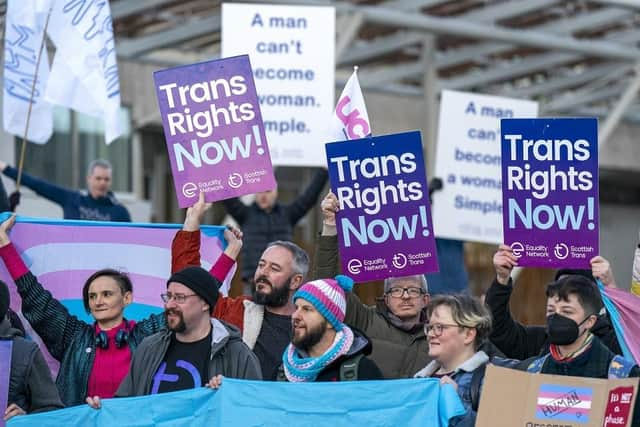Gender Bill court challenge: SNP reject Tory calls to publish legal advice on Section 35 court challenge
Earlier this year the UK Government issued the order in what was the first use of the power included in the Scotland Act – a move described as a “political weapon” by the SNP’s coalition partners, the Scottish Greens.
The decision blocked the Gender Recognition Reform Bill, backed by an significant majority of MSPs across all parties, from receiving royal assent and becoming law.
Advertisement
Hide AdAdvertisement
Hide AdAfter several months, Humza Yousaf’s Government announced they would challenge the order in the courts.


It comes after the First Minister said he would only not do so if he was told by the Lord Advocate he would lose such a challenge.
However, social justice secretary Shirley-Anne Somerville rejected calls from the Scottish Conservatives to publish the advice, citing the ministerial code and the convention legal advice is not routinely published.
Recent decisions, both by the Government and following The Scotsman’s transparency battle, has seen legal advice around independence referendums and the harassment complaints against former first minister Alex Salmond published.
In response to a question from Donald Cameron, the Scottish Tory constitution spokesperson, Ms Somerville told MSPs the Government would instead publish the petition for judicial review, effectively a statement of their legal argument.
She said: “As the member will well know, there is a convention not to publish legal advice and it is exactly the same position the UK Government will take as well as we move forward with this. I would again strongly, strongly caution against any suggestion that we are doing this out of a desire to take this as our first course of action.
"The alternatives that we have were closed down to us by the UK Government, not through our decisions, but by the UK Government. I make no apology for standing up for the rights of this Parliament and for a Bill that this Parliament has passed.”
Mr Cameron said it was “deeply disappointing” the legal advice would not be published. He said: “Despite the UK Government publishing its very detailed statement of reasons behind its decision, we are yet to see the details of the Scottish Government’s legal position.
Advertisement
Hide AdAdvertisement
Hide Ad“If it is in the public interest for the Scottish Government to challenge the section 35 order then it logically follows that it is also in the public interest for the Scottish Government to publish its legal advice.”
Scottish Labour’s social justice spokesperson Paul O’Kane said the decision to take court action meant delays for trans people looking forward to reform of the law. He said: “This issue is too serious and too important to be reduced simply to a political debate or a constitutional football.”
Scottish Greens equalities spokesperson Maggie Chapman said the UK Government had “acted disgracefully”.
She said: “This challenge is vital for the rights of trans people and for Scotland’s democracy. It should be supported by everyone who believes in human rights and devolution. The challenge comes at a time when Westminster is spreading the most disgraceful disinformation about trans people and is threatening to roll back on basic rights that have existed for many years.
“The Tories are clearly acting in bad faith, and clearly have no intention of genuine discussion. They are using the section 35 order as a weapon in their cynical and hateful culture war against trans people and the wider LGBTQIA+ community.”
A UK Government spokeswoman said: “The UK Government will robustly defend the decision to prevent the Scottish Government’s Gender Recognition Reform Bill from becoming law. The Scottish secretary made the order under section 35 of the Scotland Act 1998 after thorough and careful consideration of all the relevant advice and the policy implications.
“He was very clear in the accompanying statement of reasons how the Bill would have an adverse effect on reserved matters, including on the operation of the law as it applies to Great Britain-wide equalities protections.
“The use of the power is entirely within the devolution settlement as set out from its inception, with cross-party support.”
Comments
Want to join the conversation? Please or to comment on this article.
